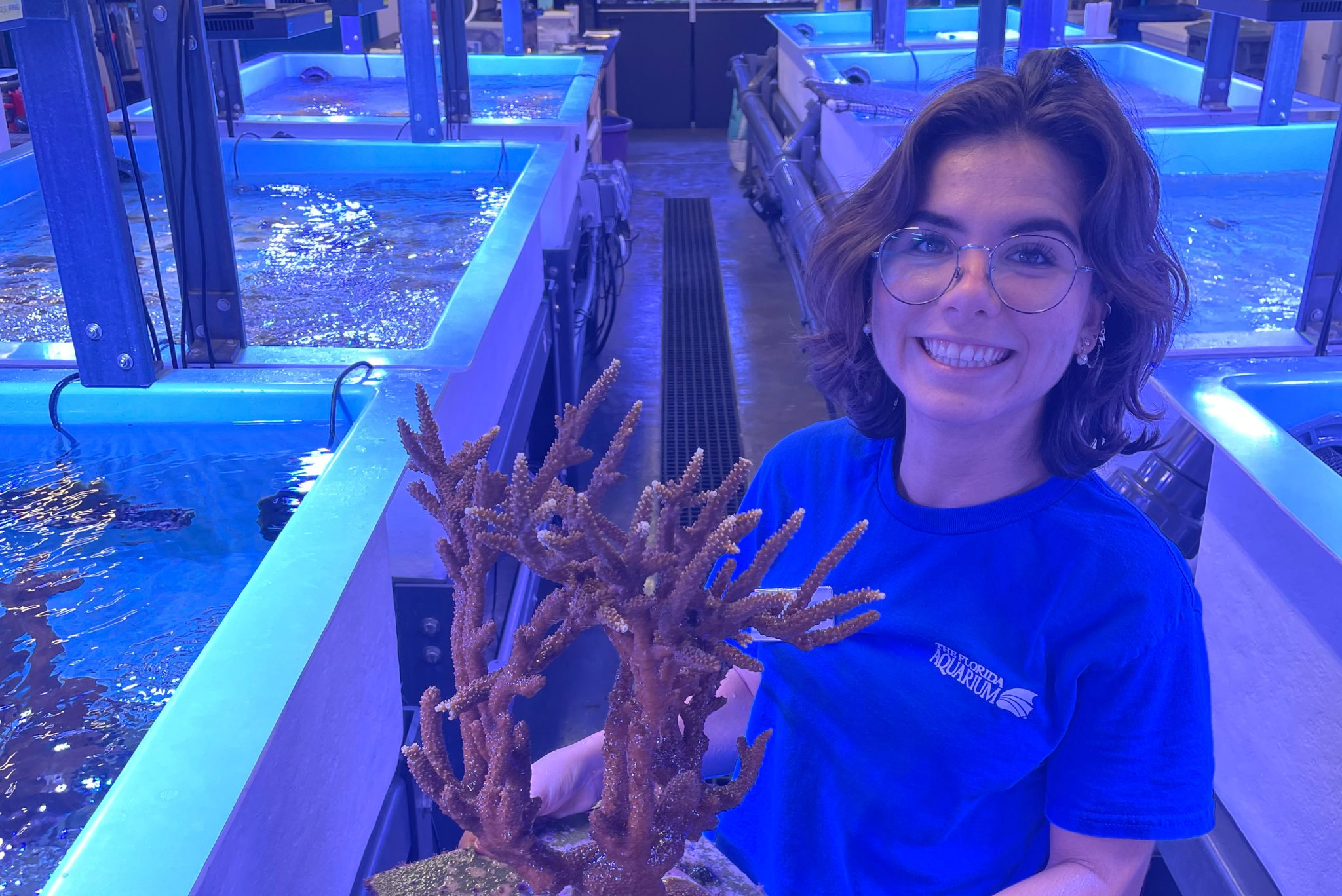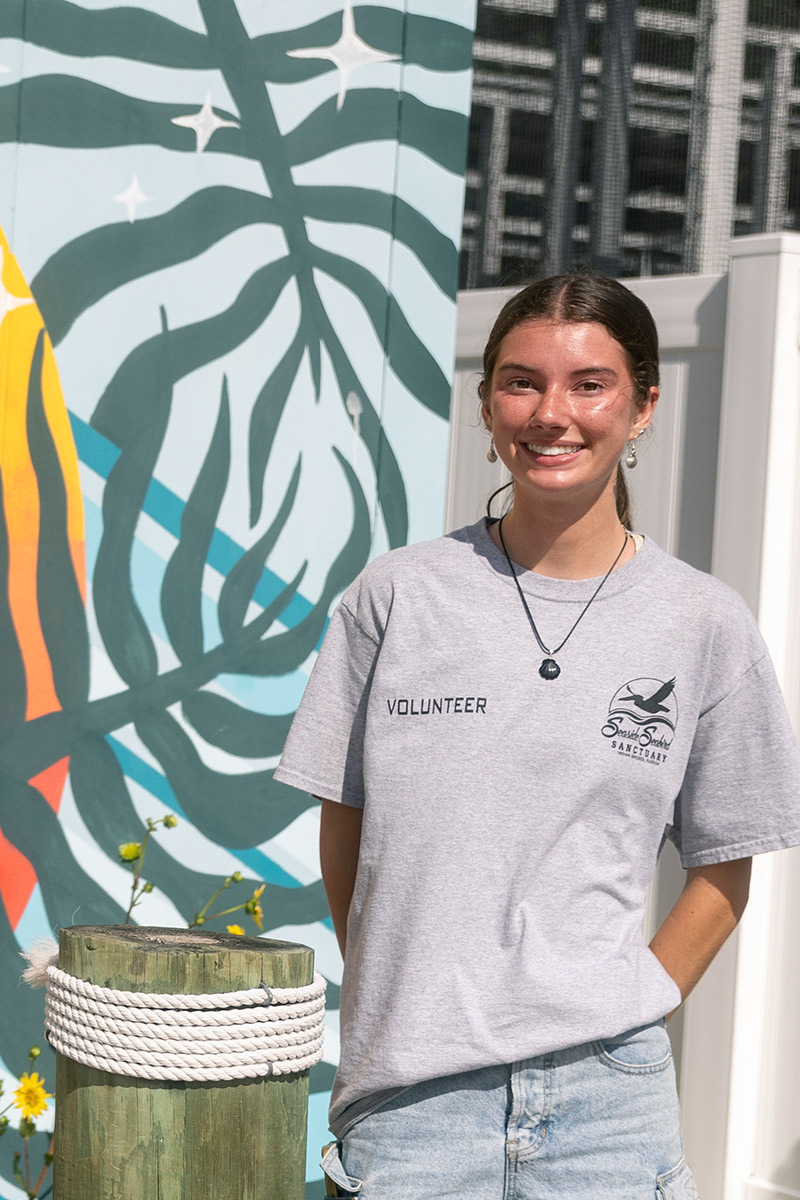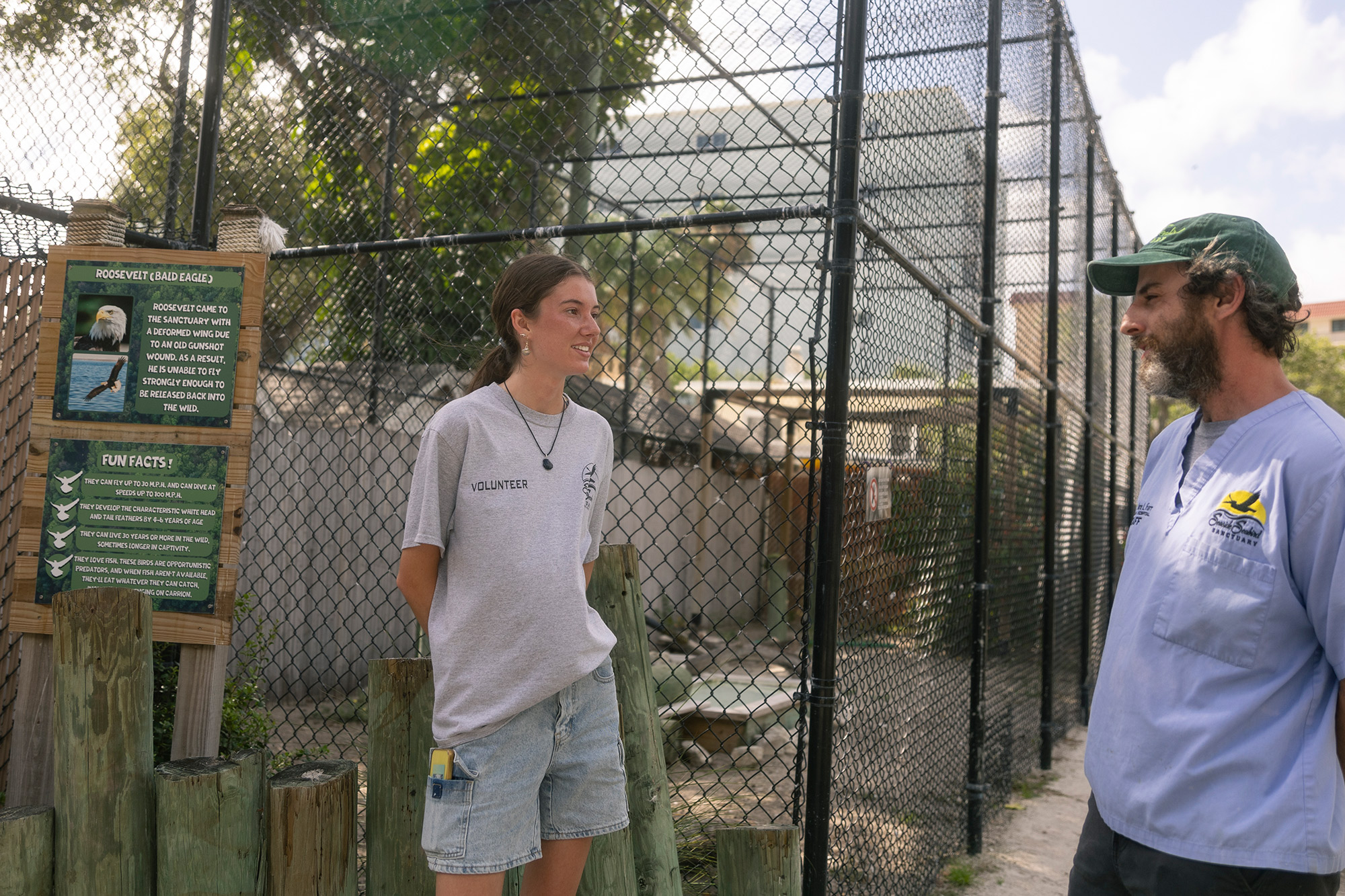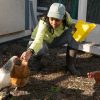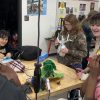When Isabella Helm was a child living in Chicago, her parents often rented a vacation condo on Indian Shores, a beach town about 15 miles north of Eckerd College.
A few doors down from the condo was the Suncoast Seabird Sanctuary, which for decades was the largest not-for-profit wild-bird sanctuary and rehabilitation center in the United States. “I went there all the time,” Isabella recalls. “It was a really fun place. I grew up visiting the Sanctuary.”
Thanks to an academic internship from Eckerd, she’s back. A junior animal studies and environmental studies student at the College, Isabella now works as an intern at the same facility, which has been renamed the Seaside Seabird Sanctuary. The Sanctuary includes an avian hospital and treats about 3,500 birds every year. Isabella helps feed and care for the birds, and has offered to do outreach events for the Sanctuary.
About 130 Eckerd students are taking advantage of a Summer 2024 academic internship, either through regular courses or the College’s Independent Academic Internship Agreement. Isabella is a student assistant in Eckerd’s Career Center, the place where internships begin.
“The people at the Career Center helped me with my resume and interview skills,” Isabella says, “and it was amazing how much they supported me throughout the whole process.” She sat for an interview and was hired almost immediately.
“The internship has given me a foundation on how nonprofits work, it’s helping me to see if this field is what I want, and I get really valuable experience that I can use no matter what direction I want to go.”
Alumna Maddy Gumprecht ’21 is the Center’s employer relations and internships coordinator. While internships aren’t required for all majors, the Career Center recommends students pursue these experiential learning opportunities. “We encourage students to start in Autumn Term, so they may explore as many of these experiences as they want,” Gumprecht says. “We’re here for them from the beginning.”
Eckerd partners with organizations such as Tampa Bay Watch, Pinellas County Government, the United States Geological Survey, Mote Marine Laboratory and The Children’s Dream Fund. Gumprecht prefers interns to be paid and often works with employers to encourage them to offer compensation to ensure all students have equal access to the opportunities.
Thanks to the generosity of Eckerd alumni, family, faculty, staff and friends, an endowment has been created that helps fund unpaid or underfunded academic internships. The Academic Internship Fund, managed by Gumprecht and Kat Robinson, Ph.D., assistant dean of faculty at Eckerd, could provide a student up to $3,500 to cover the costs of an internship.
One way to measure the importance of an internship, Gumprecht explains, can be found in a 2022 survey by the National Association of Colleges and Employers that underscores the connection between internships and jobs. “Internships—particularly paid internships—are direct pathways to job offers,” the survey notes. Gumprecht adds that a person is about twice as likely to get hired if they had an internship in a given field or profession.
The most popular majors for internships at Eckerd are marketing, human development, environmental studies, animal studies, psychology and marine science. Which brings us to Sofi Juarez Mora, a senior marine science student from Cancun, Mexico, minoring in chemistry and French. Sofi became part of the Career Center’s Career Mentor Program, which pairs students with professionals, often alumni of the College, for monthly conversations to provide guidance in their next professional step.
Sofi was paired with alumnus Chris Dukes ’13, and they found an internship at the Florida Aquarium’s Coral Conservation and Research Center, in Apollo Beach. The Center conducts projects involving protecting coral species at risk of extinction, increasing coral reproduction rates, advancing coral health and restoring the Florida Reef.
Sofi’s job is to help monitor the health of the coral. “They’re amazing organisms,” she explains. “They start out as tiny larvae and grow very big. And we really rely on them to support other marine life. But they need us now. And I am very worried. I saw it firsthand last summer when much of the coral bleached and died. It was really devastating. But there is not just one solution, which is why research is so important.”
Sofi wakes up around 6 a.m. every weekday, hops in her 2018 blue Ford EcoSport named Anita, and makes the 45-minute drive across the Sunshine Skyway Bridge. She wants to gain as much experience as she can to prepare for graduate school and potential jobs after that.
“And for other international students out there looking for internships,” she suggests, “there are lots of options if you look for them. The College will help you find an opportunity. You just need to look.”
“For both myself and everyone at the Career Center, our goal is for students to find opportunities that will answer their most challenging career-related questions,” Gumprecht says. “The main one is whether this is the right job for the student in the correct industry or field. So that by the time they graduate, they’ve already answered key questions, and that makes the job-search process easier.”
At Eckerd, a credit-bearing internship usually requires a minimum of 150 hours of on-site work per course credit, and it doesn’t need to be on campus, in St. Petersburg or even in Florida. Olivia Lord, a junior marine science student, wanted to work close to home, so she found an internship at the Minnesota Department of Natural Resources. “I’m working with the River Ecology Unit,” she explains, “and we travel around the state surveying the streams and rivers and the fish populations.
“It’s been really exciting to have this opportunity to learn research methods and study ichthyology with the people from the River Ecology Unit. I want to go to grad school and continue to do this kind of work.”
Internships are just one part of the bigger picture, Gumprecht adds. “Experiential learning opportunities can also include service learning projects, study abroad trips or academic research. The Career Center encourages students to pursue a combination of these experiences to answer the career-related questions that will best prepare them for life after graduation.”





